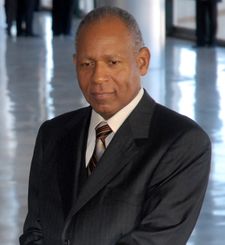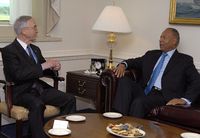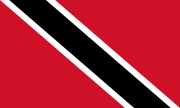Patrick Manning
| Patrick Manning | |
 Manning in 2008. |
|
|
4th & 6th Prime Minister of Trinidad and Tobago
|
|
| In office 24 December 2001 – 26 May 2010 |
|
| President | Arthur Robinson George Maxwell Richards |
|---|---|
| Preceded by | Basdeo Panday |
| Succeeded by | Kamla Persad-Bissessar |
| In office 17 December 1991 – 9 November 1995 |
|
| President | Noor Hassanali |
| Preceded by | Arthur Robinson |
| Succeeded by | Basdeo Panday |
|
Member of Parliament
for San Fernando East |
|
| Incumbent | |
| Assumed office 1971 |
|
| Preceded by | Gerard Montano |
| Majority | 10,320 (70.6%) |
|
Leader of the Opposition
|
|
| In office 1995–2001 |
|
| Preceded by | Basdeo Panday |
| Succeeded by | Basdeo Panday |
| In office 1986–1991 |
|
| Preceded by | Basdeo Panday |
| Succeeded by | Basdeo Panday |
|
Leader of the People's National Movement
|
|
| In office 1987–2010 |
|
| Preceded by | George Chambers |
| Succeeded by | Keith Rowley |
|
Minister of Energy and Natural Resources
|
|
| In office 1981–1986 |
|
| Prime Minister | George Chambers |
|
Minister of Information
|
|
| In office 1981–1981 |
|
| Prime Minister | George Chambers |
|
|
|
| Born | 17 August 1946 San Fernando, Trinidad and Tobago |
| Birth name | Patrick Augustus Mervyn Manning |
| Nationality | Trinidadian |
| Political party | People's National Movement |
| Spouse(s) | Hazel Manning (1972-) |
| Alma mater | University of the West Indies |
| Occupation | Geologist |
| Religion | Anglicanism |
| Website | Official website |
Patrick Augustus Mervyn Manning (born 17 August 1946) was the fourth and sixth Prime Minister of Trinidad and Tobago, as well as the former Political Leader of the People's National Movement (PNM)[1]. He served as Prime Minister from 17 December 1991 to 9 November 1995 and held that office again from 24 December 2001 until 26 May 2010. He was also the Leader of the Opposition from 1986 to 1990 and from 1995 to 2001. He was the Political Leader of the PNM from 1987 to 2010. A geologist by training, Manning has served as Member of Parliament for the San Fernando East constituency since 1971 and is currently the longest-serving member of the House of Representatives.[2]
Manning was born in San Fernando and received his secondary education at Presentation College, San Fernando, and his Bachelor's Degree from the University of the West Indies at Mona, in 1969. After graduation he returned to Trinidad where he worked as a geologist for Texaco. He entered Parliament in 1971 representing the San Fernando East constituency.[2]
Contents |
Life
Early career
After graduating from the University of the West Indies, Manning worked as a geologist with Texaco Trinidad Ltd., until he ran for Parliament in 1971. Between 1971 and 1978 he served as Parliamentary Secretary in various Ministries before being appointed junior Minister in the Ministry of Finance. In 1979 he was given the additional position of junior Minister in the Office of the Prime Minister. In 1981 he was given a full Cabinet position of Minister of Information and Minister of Industry and Commerce. Between 1981 and 1986 he served as Minister of Energy and Natural Resources.[2]
The 1986 General Elections the ruling PNM suffered an almost total defeat. Only three candidates won their seats; the Prime Minister, George Chambers was among the losing candidates. As one of the three successful PNM candidates, Manning was appointed Leader of the Opposition. In 1987 he was elected Political Leader of the PNM. A split in the ruling National Alliance for Reconstruction in 1988 left the PNM as the minority Opposition party, and in 1990 Basdeo Panday requested that he be appointed Leader of the Opposition.[3].
Second term as Prime Minister
In 1995, Manning called a General Election one full year before it was constitutionally due. In this election both the PNM and the UNC won 17 seats each and the NAR won 2 seats. The UNC and the NAR united in a coalition and formed the government; Basdeo Panday replaced Manning as Prime Minister. Manning served as Leader of the Opposition once again, also losing the 2000 elections. The 2001 elections ended in a tie, with both the Opposition PNM and the governing United National Congress winning 18 seats. President A. N. R. Robinson appointed Manning as Prime Minister. Unable to elect a Speaker of the House of Representatives, Manning proceeded to rule without Parliament until the need to pass a Budget forced him to call elections in October 2002. His party won this election with 20 seats to 16 for the UNC and formed the new government.

Under the current PNM administration, income taxes have been substantially reduced and the Corporation Tax has been reduced from 35% to 25% of profits for most companies. The Government has also re-instituted free university education. The economy is currently booming, primarily due to high natural gas and oil prices and to significant increases in natural gas production.[4] In September 2007, Manning received an honorary doctorate from Medgar Evers College, CUNY.
Third term as Prime Minister
In 2007, Manning called for a general election to be held on 4 November. The PNM won this election with 26 of the 41 seats and Manning began his third term as Prime Minister. Since then the country has experienced a slow down in the economy. Despite this the economic ratings of the country has come in for high praises mainly from the Standards and Poor report on August 15, 2008 which raised Trinidad and Tobago from an "A-" to an "A". The Government of Trinidad and Tobago also hosted their Majesties King Juan Carlos I and Queen Sofia of Spain on November 30 to December 2, 2008. The purpose of the visit was to strengthen the economic ties between Spain, Latin America and the Caribbean and also to open new markets and possibility for increase trading and the opening of new markets. The country was also hosted two world summits. The 5th Summit of the Americas on 17 to 19 April 2009 as well as The Commonwealth Heads of Government on 27 to 29 November 2009.
The Chilean President Michelle Bachelet paid Prime Minister Patrick Manning and the Government of Trinidad and Tobago a visit in 2010. The purpose being to strengthen bilateral ties between the two countries and as a result a formal agreement was signed in an effort to unite the two countries. Although Trinidad and Tobago is doing well economically, the country under the leadership on Prime Minister Patrick Manning isn't without its problems. Crime is an example. The number of murders increased sharply from 93 in 1999 to 509 in 2009. Additionally, 2008 saw the country's highest number of murders with 550. The Prime Minister's explains that the crime problem in country is a result of the illegal drug and arms trade. His speech at the 5th summit of the America points to the fact that the Caribbean is situated between the narcotic producing South American continent and the narcotic consuming North American continent. Some of his crime detection and prevention methods includes the introduction of Special Anti-Crime Unit of Trinidad and Tobago (SAUTT), two surveillance airships (commonly referred to as blimps). The most recent being the inclusion of six high speed off-shore patrol vessels for better control of the country's maritime borders and coastlines on February 15, 2010. Prime Minister Patrick Manning has been quoted as saying that the country can expect to see a 50% decrease in crime because of this most recent effort.
2010 Elections
On April 9th 2010 Prime Minister Patrick Manning advised President George Maxwell Richards to dissolve Parliament resulting in a General Election to be held 2 years sooner than was constitutionally mandated. Prime Minister Patrick Manning later announced May 24th as the date for general elections.On May 24th Manning along with the PNM lost the National election to The People's Partnership (UNC,COP,TOP). Following the defeat, there were many calls for his resignation from the party. On 27 May he officially resigned as Political Leader of PNM.
References
- ↑ [1]
- ↑ 2.0 2.1 2.2 Biographical Summary of the Prime Minister of Trinidad and Tobago, from NALIS, the National Library and Information Service of Trinidad and Tobago
- ↑ Meighoo, Kirk (2003). Politics in a Half Made Society: Trinidad and Tobago, 1925-2002. Ian Randle Publishers, Kingston, Jamaica. ISBN 976-637-079-6.
- ↑ Guardian.co.uk
| Party political offices | ||
|---|---|---|
| Preceded by George Chambers |
Leader of the People's National Movement 1987–2010 |
Succeeded by Keith Rowley |
| Political offices | ||
| Preceded by Basdeo Panday |
Leader of the Opposition 1986–1989 |
Succeeded by Basdeo Panday |
| Preceded by Arthur Robinson |
Prime Minister of Trinidad and Tobago 1991–1995 |
|
| Preceded by Basdeo Panday |
Leader of the Opposition 1995–2001 |
|
| Preceded by Gerard Yetming |
Minister of Finance 2001–2007 |
Succeeded by Karen Nunez Tesheira |
| Preceded by Basdeo Panday |
Prime Minister of Trinidad and Tobago 2001–2010 |
Succeeded by Kamla Persad-Bissessar |
| Diplomatic posts | ||
| Preceded by Yoweri Museveni |
Commonwealth Chairperson-in-Office 2009–2010 |
Succeeded by Kamla Persad-Bissessar |
|
|||||||||
|
|||||
|
||||||||||||||

